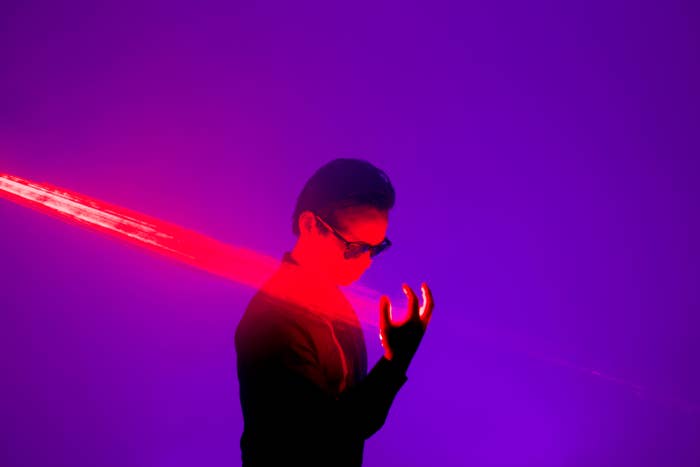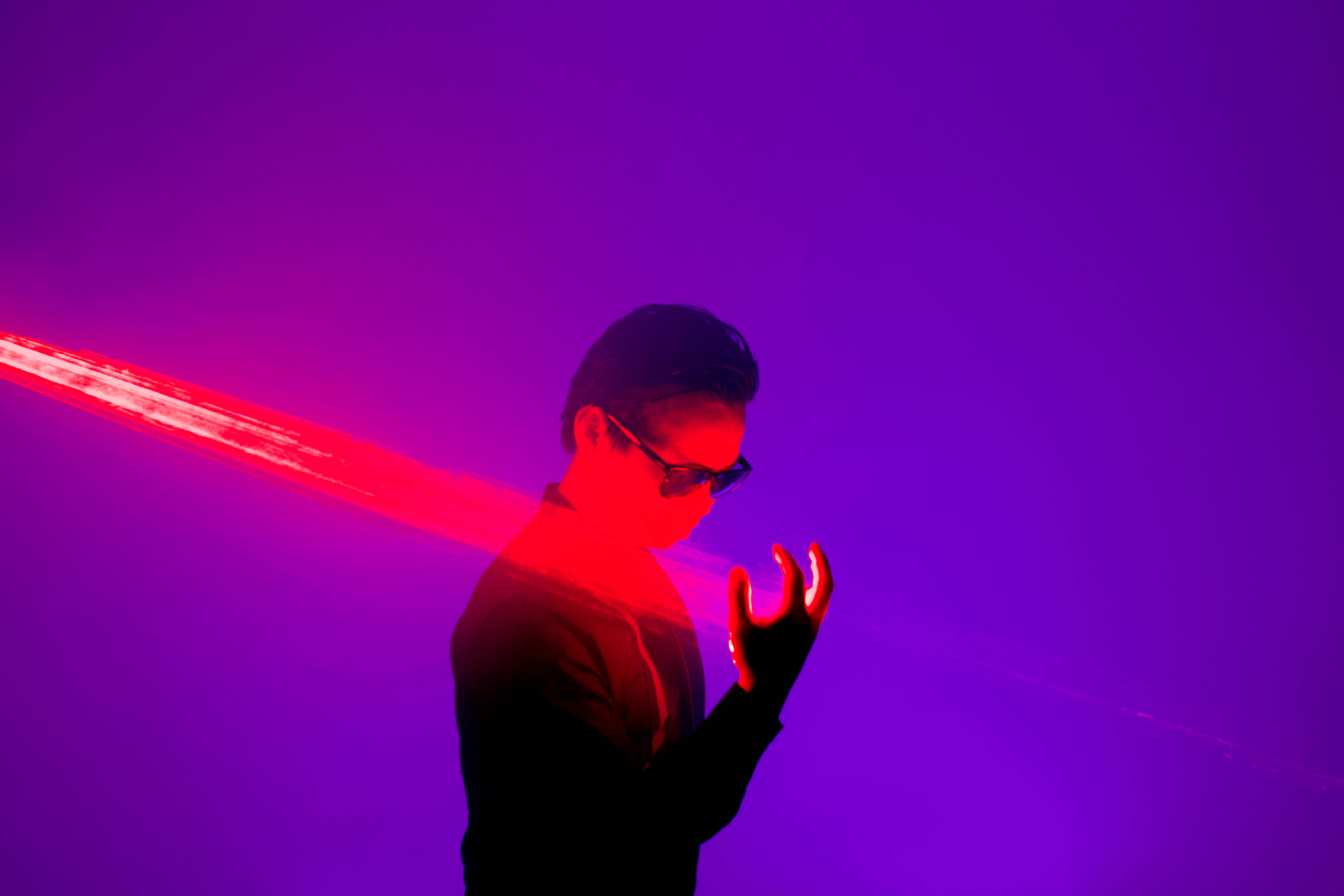
If you’ve spent even a few minutes googling Zhu, the terms elusive, mysterious and enigmatic, among other synonyms, have all seemed to loom heavily over the artist since his sonic surfacing in 2014. His intention, in shrouding his identity, was to present an alternative to the DJs and producers that were promoting their mugs first, and their music second. As the media is wont to do, they became obsessed with this one facet of the Zhu persona – and they’ve never let it go.
In The Wizard Of Oz, the curtain pulls back to reveal a figure much smaller, less impressive, and hardly as wonderful as promised. While it’s almost three years later and we still haven’t seen his face, there’s no longer a mystery to be solved, nor a deceptive figure to be exposed.
Instead, 27-year-old Steven Zhu has been revealed to be a lover of music, with great respect and reverence for those that came before him. He’s producing some of the most soulful electronic music around, in a genre that’s in a phase of heavy mass production. And he’s created a style so inimitable, it’d be foolhardy to even try. His latest project, Generationwhy, is the proof.
View this video on YouTube
The album, Zhu says, is about millennials and their endless pursuit of any kind of affinity: “I feel like people are searching for a type of relationship, a community – a place they can belong.” The album’s cover features a small, naked child with its eyes closed, veiled in a deep red. By the end of the piece, it becomes a mirror for the audience, led back to the feelings of rebirth and youthful innocence Zhu has said he tried to evoke with the project.
The eternally youthful Los Angeles seems an appropriate setting to draw subject matter from, then. While he’s expectedly cagey about admitting which experiences of his own bled onto Generationwhy, Zhu says he’s been able to extract the tales of those around him, and carefully implant them into his slick sound-beds.
“Being under the radar, I'm able to observe a lot more stuff that happens without being the guy people pay attention to too much,” he says. “In some ways that's very spy-like.” Perhaps most importantly, he’s told stories that their real-life owners might not be able to express so artfully. And of course, the rest is just poetic license; “like all people who create, part is fantasy and part is reality,” Zhu says.
While most of the framework for this blend of fact and fiction was moulded at home base in L.A., Zhu also spent two weeks in New Orleans with a cavalcade of local collaborators. “Everybody in that town knows how to play music,” he says. Zhu adds that the soulful, jazzier feel on tracks like “Cold Blooded” was certainly inspired by the deep culture of one of the oldest cities in the world. “Recording in a place that's really kind of the origins of a lot of the music in America, it gave me great inspiration and context to what I was doing.”
View this video on YouTube
It seems he looks to history often when navigating his own compositions. “I think people who say ‘fuck the people in the past’ and just do stuff on their own, that's a cool attitude but you don't get to really sink into–you don't get to learn–I think, as a human being,” Zhu says. In light of this, he can name a slew of classic artists and what he drew from each to stitch together Generationwhy: “[Prince’s] delivery, the kind of creativeness to be maximal and minimal at the same time. Sade, for just the elegance in her music [and] Pink Floyd for a lot of the instrumental guitar work and the bluesy, psychedelic stuff.”
On the album, songs like “Palm Of My Hand” pay homage to that vibrant psychedelia synonymous with the early work of bands Zhu looked up to – not just Floyd, but The Doors as well. “There was something kind of soulful and bluesy about it, and I wanted to incorporate some more soul into electronic music. I wanted to humanise it a little bit more,” he says. Navigating a genre that’s always been fixated on the future, it’s a bold move to attempt to inject that old-school sensibility into electronica.
The house virtuoso has recently worked on a number of remixes to some legendary dance records – namely, “In The Morning” from this album, which reconstitutes elements of Rui da Silva’s “Touch Me”, as well as a live-only version of Faithless’ “Insomnia”. While many would be intimidated by the stakes in touching such huge standards, Zhu says that they’re simply an exercise in taking the classic rave and dance records he loves and seeing how he can modernise them – “if it works it works, if it doesn't, it doesn't.”
View this video on YouTube
While a superficial listener might simply pigeonhole Zhu’s output into the dance category, his metered, distinctive vocals, which often include pitched-down, screwed refrains, are unmistakably hip-hop. In fact, some of the very first material to be released under the Zhu banner was “Moves Like Ms. Jackson”, a medley of some of Outkast’s most recognisable cuts.
More recently, his collaboration with Bone Thugs-N-Harmony on his previous project Genesis Series simultaneously made sense and surprised, with the midwest marauders’ rapid-fire flows sliding effortlessly over Zhu’s funk-house grooves. While the dance records he reveres and reinterprets might have all burst forth from Europe, the unique swing to Zhu's tracks is arguably indebted to his American origins. “The bounce and rhythm that we have here is nothing like any other place, and I think that's kind of unique to just the States,” he says.
As a teen, Zhu was at the periphery of his native Bay Area’s hyphy movement. But when he talks about hip-hop, he says he leans heavily on the old standards, most often re-visiting classics from Dr. Dre, Nas, Jay-Z and Kanye West. When probed on what’s in rotation from rap’s new generation, he’s surprisingly quick to mention Future’s DS2. It’s not too much of a stretch to imagine the two working together, with similar strokes of darkness and loneliness colouring both of their aesthetics.
Finding common ground with other talented artists has proven to be fruitful; Zhu’s most recent single, a collaboration with the ubiquitous Skrillex called “Working For It”, was a top 30 track on Australian charts. Even more impressively, his first single “Faded” peaked at number three here in 2014, and the album it featured on landed itself in the top ten. Triple J were actually one of the first radio stations to give “Faded” support internationally. Australia’s early adoption of Zhu’s future-proofed sound was a key to his success, and he feels it’s a connection that was forged through being the right guy, at the right time.
View this video on YouTube
“People were tired of the Big Room-type sound and were looking for something a little more intimate–a little more chilled but still danceable–and it seems to me that rawness of the sound of that record really resonated over there.” To Zhu, Australia feels slightly ahead of the curve in comparison to what’s happening in the States: “I think there's a special connection with the type of electronic music that's going off in Sydney and Melbourne and these places, and it's quite progressive.”
Seemingly responding to the strength of that fan love, Zhu hooked up a collaboration with evanescent local spectre Daniel Johns on the slinky “Modern Conversations”, a song for Genesis Series. The duo had been exchanging emails, and finding himself in a studio in Surry Hills, Zhu called Johns in to work together for two days. While he admits to not having listened to Silverchair’s Frogstomp in its entirety, he was surprised at what he got from Johns: “when he got into the studio to do some vocals and stuff, it was definitely a different vibe than ‘Tomorrow’ or any of those records,” he says. “It was kind of like he wanted to find something else, and I was down with that.”
With his live show set to hit the Beyond The Valley festival here over the new year, we can expect nothing short of immersive. “What I've tried to do is really create an environment with the music that people can get sucked into,” he says. A big part of that, he thinks, will be some new, more aggressive, more symphonic material. His previous appearances in Australia have often been short, so he’s hoping to take in more of his surroundings this time around. “I've been integrating a lot of art, video, fashion stuff into the music that I've done, and I know Australia's quite forward in those departments, especially combining different aspects,” he says. “That stuff really intrigues me.”
Despite his clear affinity with history, Zhu seems to gravitate equally towards the progressive, and it’s his curiosity that connects the two. He explains that the album, and its title, is designed to spark that same curiosity in us – to remind people of the questions they should be asking of the world, and most importantly, of themselves. While his initial anonymity raised his entire existence as a question, with Generationwhy, Zhu turns the tables on the public at large. This time, the wizard pulls the curtain back on us.



![It seems he looks to history often when navigating his own compositions. “I think people who say ‘fuck the people in the past’ and just do stuff on their own, that's a cool attitude but you don't get to really sink into–you don't get to learn–I think, as a human being,” Zhu says. In light of this, he can name a slew of classic artists and what he drew from each to stitch together Generationwhy: “[Prince’s] delivery, the kind of creativeness to be maximal and minimal at the same time. Sade, for just the elegance in her music [and] Pink Floyd for a lot of the instrumental guitar work and the bluesy, psychedelic stuff.”
On the album, songs like “Palm Of My Hand” pay homage to that vibrant psychedelia synonymous with the early work of bands Zhu looked up to – not just Floyd, but The Doors as well. “There was something kind of soulful and bluesy about it, and I wanted to incorporate some more soul into electronic music. I wanted to humanise it a little bit more,” he says. Navigating a genre that’s always been fixated on the future, it’s a bold move to attempt to inject that old-school sensibility into electronica.
The house virtuoso has recently worked on a number of remixes to some legendary dance records – namely, “In The Morning” from this album, which reconstitutes elements of Rui da Silva’s “Touch Me”, as well as a live-only version of Faithless’ “Insomnia”. While many would be intimidated by the stakes in touching such huge standards, Zhu says that they’re simply an exercise in taking the classic rave and dance records he loves and seeing how he can modernise them – “if it works it works, if it doesn't, it doesn't.”](https://img.youtube.com/vi/EyjtTwnSfOk/mqdefault.jpg)

